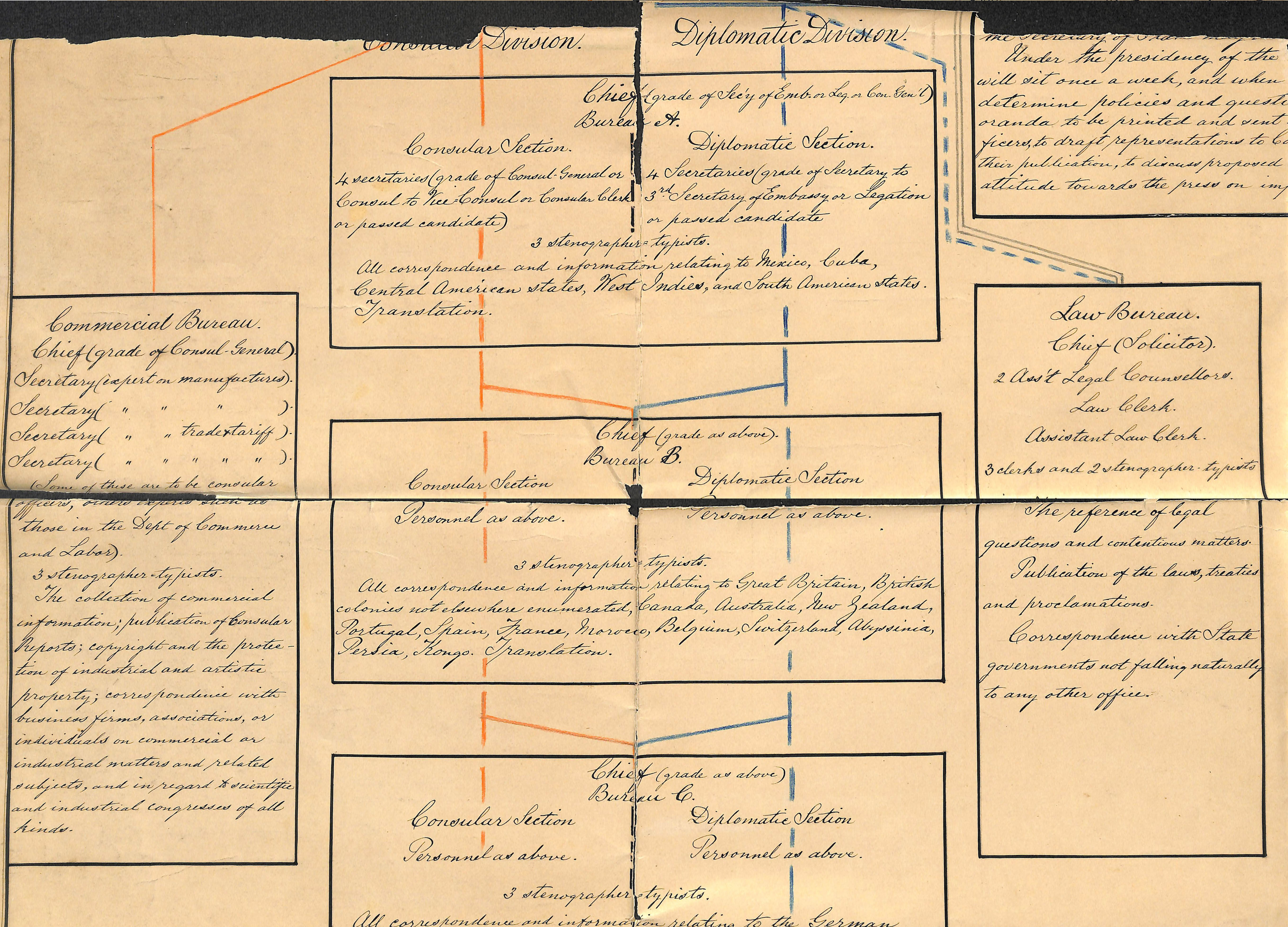
Organization of the State Department
Document Type
Letter
Files
Download Full Text (1008 KB)
Date
12-21-1909
Keywords
Elbert F. Baldwin, Philander C. Knox, William Howard Taft, The Outlook, magazine, State Department reorganization, salaries, Thomas Cleland Dawson, Henry Hoyt
Description
The document is a carbon copy of a typed letter from the Assistant Secretary of State to Elbert F. Baldwin concerning the re-organization of the Department of State.
Sender
Francis Mairs Huntington-Wilson
Recipient
Elbert F. Baldwin
Corresponds to:
Folder 1-8, Document 220
City
Washington, D.C.
Transcription
[Personal + Private]
December 21, 1909.
My dear Mr. Baldwin:
I am glad you are interested in the re-organization of the Department of State which Mr. Knox has already brought so far toward a satisfactory completion. You are quite right that I have for years hoped that we should have a Secretary of State who would do this, and you can therefore readily realize what a special satisfaction it is to me to serve under a Secretary who is so rapidly accomplishing this, to my mind, most important achievement.
If you will read what the President says of the Department of State has in his annual message, and if you will examine the Secretary's letter, a copy of which I enclose herewith (wherein it is requested that our new appropriation be made specific for the next fiscal year) I think you will understand very clearly what has been done and the underlying principles of it all, including the principle of the politico-geographical division and that of the interchangeability between the foreign field and the Department.
Elbert F. Baldwin, Esquire,
The Outlook, New York City.
- 2 -
The disparity of salaries you will observe is not so great as you have guessed. I think I can explain it to you also that it is unobjectionable. In many foreign offices a large part of the personnel consists of diplomatic service and consular service men, who retain their foreign service grades and salaries. Thus it is not extraordinary that a Minister attached to the Foreign Office should receive more than his superior officer, the Vice Minister, Under Secretary or, with us, the Assistant Secretary. Understanding these principles I find nothing extraordinary in the fact that Mr. Dawson and Mr. Hoyt receive twenty-five hundred dollars more than I do. To be sure, in other countries there would probably be a frais de representation for the Vice Minister as there would be for the Minister for Foreign Affairs, just as in many countries there are official residences and even State dining rooms attached to the Foreign Office.
Upon the above principles still less do I consider it curious that the Solicitor should receive less than the Counsellor and Mr. Dawson or that the Chiefs of Bureaus should receive less than the commercial experts and some of the foreign service men who are on duty for the purpose of specializing in the most difficult work of the Department. I want to call to your attention also the fact that if Congress passes the appropriation as we want it, Bureau chiefs and others in the Department will be eligible to these new and more highly paid posts, -- in case any of them should develop the peculiar high qualifications demanded. As for the Director of the Consular Service, his
- 3 -
position corresponds to what would be a Fourth Assistant Secretaryship, -- the actual administrator of the consular service, under whom works the Consular Bureau.
Speaking of the Diplomatic Bureau, of course the creation of the four politico-geographical divisions, which handle the most difficult drafting, reduces the importance of the Bureau in question. It is conceivable, indeed, that it may be consolidated with another Bureau.
Of course, you have read the diplomatic service Executive order. You will see in it more that is suggestive on the point of interchangeability and also on the point of our attempt to galvanize and raise to a higher level of initiative and energy the rank and file of the Departmental personnel.
You know in an Embassy the First Secretary is head of the Chancery and ought to make all necessary suggestions of initiative and submit drafts upon everything, and hold himself responsible that nothing shall be forgotten. The office of the Assistant Secretary is intended to occupy a corresponding position toward that of the Secretary; and the head of every Bureau, Division, or Office is expected to take similar responsibility toward the office of Assistant Secretary. In this way there is built up a logical pyramid of successive responsibilities which ought to leave no loopholes for the neglect or slighting of any bit of business.
- 4 -
Of course, this letter goes much beyond answering your questions, but I could not resist talking at some length on this subject which I have so much at heart. Of course, all I say is quite personal and private, and if it be of any suggestive value to you I shall be very glad.
Yours sincerely,
[signature]
Enclosure, supra.
[P.S. Another reason why an American Secretary of State should have a good machine for his Diplomatic work is the fact that he has also the duties of Prime Minister.]
[HW]
Language
English
Rights Statement
Please contact the Myrin Library Special Collections Department for permissions to use this document. https://www.ursinus.edu/library/archives-special-collections/
Recommended Citation
Huntington-Wilson, Francis Mairs, "Letter From Francis Mairs Huntington-Wilson to Elbert F. Baldwin, December 21, 1909" (1909). Organization of the State Department. 3.
https://digitalcommons.ursinus.edu/fmhw_organization/3



